Until recently, I thought a Whovian was an expert in all matters scientific relating to the Whos of Whoville. Horton, of course, being the prime example of such. Turns out a Whovian is a serious fan of the Doctor Who television programme, and is typically not an elephant. Until recently I had seen no Doctor Whos at all, save a few tiny bits and pieces of the original version when I was but a wee sprite, which to my naïve eyes looked like it had been cobbled together from junk found in a shed, then actually filmed inside that same shed. I stuck to Star Trek (the original, i.e. the only Star Trek).
Recently I decided to remedy my Wholess life and watch all seven seasons (as of this writing) of the modern Who, so watch them I did.
Turns out I like Doctor Who. It often makes not a lick of sense, a number of less than stellar episodes muck up the flow, and there’s an irritating tendency to undercut powerful emotional moments by reversing everything bad that ever happens/happened to everyone, and yet—still—it remains compelling television, which for me is a rare thing to find.
Changing the stars of the show, though a bit jarring every time it happens, is an excellent way to keep it fresh. In fact I wish they changed stars more often. Two seasons of one Doctor is just right. As for the companions, a single season is often enough. For Donna, a single episode would have sufficed.
But on to the important matter of this, the most important, most accurate best-of-Doctor–Who list to be found anywhere in all of time and space! Accept no substitutes! Though feel free to savage me for failing to include your favorite episode. Even though it sucks.
10. Dalek (series 1, episode 6)
Christopher Eccleston is a mighty strange Doctor. I tend to like him and not like him at the same time. The first three episodes of my first Doctor Who experience were fine, but didn’t strike me as anything special. With the two-fer that followed, “Aliens of London” / “World War Three,” the show began to find its feet. Next came “Dalek,” and this is where the show finally takes off.
I knew what a Dalek was, more or less, a sort of trashcan with a plunger and an eggbeater, but I’d never seen one in action. The one we meet is chained up in a bunker in Utah containing artifacts from around the universe. It might have been silly but for one thing: Eccleston’s performance. Man does he ever sell it. He’s terrified by it and hates it with a passion. His acting imbues the Dalek with pure evil. Once he realizes how harmless it is, he becomes sadistically gleeful in his desire to kill it. For the first time, we get a glimpse of the Doctor’s grim past and how it’s shaped him.
9. The Waters of Mars (series 4 specials, episode 3)
After three solid series, series 4 is a bit of a disaster. Russell T Davies, perhaps having run out of ideas, turns everything up to 11. He brings every character back, replays the lovely parting of Rose and the Doctor from the series 2 finale as a happy ending to ill effect, fills the place with Daleks and Cybermen, and inflicts Donna on us. Clearly Davies was ready to leave.
Of the four specials to follow the proper end of series 4, “The Waters of Mars” is the best. It doesn’t start that way. At first it feels a bit rote, with the Doctor arriving at a Mars base and realizing it’s going to blow up, thus killing Captain Adeliade Brooke, whose daughter, inspired by her example, will lead humankind to the stars. It’s a fixed point in time, one he can’t change.
Which had me annoyed at first, because earlier in series 4, the Doctor does change a fixed point in time, in “The Fires of Pompeii,” a terrible episode in every respect, one that belabors every point to death, then undercuts all it so desperately tried to earn by having the Doctor save a nice family, the very thing he said was impossible, with no explanation whatsoever.
But then, as the Doctor leaves the base to its fate—this after some evil, creepy water zombies have turned up—he decides to save them anyway, and brings up “The Fires of Pompeii” as an example of his unique ability to change fixed points. He’s the Doctor. He can do anything he damn well wants. And I thought, okay, maybe this is going someplace interesting. It does.
Because the thing is, he told Adelaide before he left that she has to die for history to unfold properly. Now here he is, coming back and saving her, bringing her home to Earth, because, as he explains, he’s a Time Lord. It’s a great scene for David Tennant, whose Doctor is becoming corrupt and drunk with power. Then the kicker. Adelaide goes home—and shoots herself. The Time Lord isn’t victorious after all. We even get a ghostly Ood showing up to look on disapprovingly.
8. The Snowmen (series 7 Chistmas special)
Speaking of disasterous series, 7 might be the worst of them all. I don’t know what happened to Steven Moffat. Maybe his work on Sherlock distracted him? After two series of obsessively detailed lunacy, he seems to just give up with his third. The only episode with any power is “The Angels Take Manhattan,” in which Amy and Rory are lost, but even that one feels like it comes out of nowhere, with none of the emotional build-up seen in series 5 or 6.
“The Snowmen” is an exception. I think Moffat loves writing Christmas specials more than anything else. Unlike Davies, who simply set stories at Christmas, Moffat goes whole-xmas-hog. They’re all entertaining (though the final one, Matt Smith’s last turn as the Doctor, is absurdly convoluted), but I like “The Snowmen” the best. It helps when Richard E. Grant is your bad guy.
It’s full of good stuff, like the Doctor pretending to be Sherlock Holmes, the squiggly memory worm, the stairway into the clouds, a redesigned TARDIS (complete with tracking shot from its exterior to its interior, a first) the evil snowmen, and a new companion, Clara, who actually dies. I mean yes, not actually, this is Doctor Who, she returns again and again and again and then, when her purpose is finally revealed, when she’s to give up her human existence to save the Doctor, the Doctor saves her life. Sigh.
Anyway, the Doctor is grim and brooding after the loss of Amy and Rory. He’s in an interesting space, and it lends the episode a different feel than what had come before with Smith’s Doctor.
7. The Impossible Astronaut / Day of The Moon (series 6, episodes 1 & 2)
Moffat goes for a big opening with series 6, and I don’t think he ever tops it. There’s the big reveal of River’s identity at the midway point, but the second half of the series falters, and never quite rises to the heights of the first half.
These two episodes are enjoyably nuts, beginning with a future Doctor seemingly dying by the side of a desert lake in Utah. Soon after which a living Doctor turns up, unaware that to everyone else he’s dead. Then we’re back to 1969 with Nixon and the space program and the latest evil beings, the Silence, who along with the Weeping Angels are the creepiest bad guys on the show. There’s so much plot in these two episodes that it somewhat gets away from itself, but it’s creative and weird enough that loose ends don’t matter, and anyway the point is to set up the whole season. In that regard it’s great. Too bad the pay-off down the line doesn’t live up to it.
6. The Pandorica Opens / The Big Bang (series 5, episodes 12 & 13)
This two-fer, the series 5 closer, I’m putting in partially because it’s good, but more because it ties up the best series of the modern Doctor Who. Which is strange, it being the best series, in that none of the individual episodes is among the very best of the show. On the other hand, none of the episodes are bad, either. It’s the most consistent series. It’s solid all the way through, and it’s got the best series arc, too. Every episode feels tied to every other.
As for this two-fer in particular, it is of course completely mad. You’ve got to hand it to Steven Moffat: he’s not afraid to think big. And weird. He brings Rory back from the void as a plastic Roman centurion who kills his beloved, then waits around for two thousand years next to a big box Amy’s younger self has to touch in order to bring her older self back to life. Meanwhile, the Doctor and the entire universe are destroyed, before he initiates a second big bang and restores it, all of which goes down because Amy spent her life as a trap laid by the Doctor’s enemies to ensnare him. Plus we learn in series 6 that Rory and Amy conceived a baby inside the TARDIS at the time, making it a very big bang indeed. Ha ha.
Yes, the episode does rely a bit heavily on the “It’s the flanbulation vortex rezipplemoofing the hoopdedoo! We’re all doomed! Only wait—what if I jurflepoof the yrk with my snuv? We’re saved!” method of creating and solving problems, but what the hell, it’s still a blast.
5. Father’s Day (series 1, episode 8)
“Father’s Day,” written by Paul Cornell, shows what’s possible when the emotional heart of an episode is what drives it. At this point in the series, what is and isn’t allowable with time travel hasn’t been explained at all (has it ever?), and this episode makes no efforts at clarification, but it doesn’t matter. Versions of the Doctor and Rose vanish. A ghost car follows Rose’s dad around waiting to kill him. Sky dragons called Reapers show up to eat people and reality itself to fix a time paradox. None of this necessarily makes sense, and still it doesn’t matter. The episode is about Rose meeting her dead father, Pete, and that’s what counts.
She saves him from the car meant to kill him, creating the paradox. Trapped in a church by the deadly Reapers, Pete comes to realize that Rose is the adult version of his baby daughter, and that she never knew him. In the end, Pete understands that he’s meant to die, that the strange car appearing and disappearing outside is meant for him. So he lets it hit him. Rose holds his hand as he dies.
Doctor Who plays fast and loose with its ever-changing rules of time travel. Normally this sort of thing drives me mad. In some episodes it does drive me mad. In “Father’s Day” I don’t care about logic because I care about the characters.
4. The Girl In The Fireplace (series 2, episode 4)
And we’re back with Steven Moffat. I know, it was rough for a minute there. As showrunner, Moffat’s episodes are marked by their total insanity. His earlier episodes are marked by their restraint. Or at least by their careful crafting and attention to interior logic. They make sense, is what it is. Mostly.
“The Girl In The Fireplace” is a love story between the Doctor and Reinette, AKA Madame de Pompadour, mistress of King Louis XV. Sort of, anyway. It actually somewhat prefigures the Doctor’s relationship with Amy in series 5, in that the Doctor first meets Reinette when she’s a little girl, who thinks he’s imaginary. He does this by walking through time portals he finds in a derelict spaceship, the androids on which need Reneitte’s brain at age 37 to repair their engines. See? Makes perfect sense.
Every time the Doctor leaves 18th century France and returns, even if for him only minutes have passed, years go by for Reinette. And in the end, when he’s offered to take her away, he returns to find her dead. So, a sad love story, as all love stories are for the Doctor. Moffat also includes the first suggestion that there’s something ominous about the Doctor’s never-revealed real name.
Another bonus: Tennant riding a horse through a mirror into a ballroom. Reminding me, of course, of Time Bandits.
3. The Empty Child / The Doctor Dances (series 1, episodes 9 & 10)
It seems a shame to ignore the other fine writers on Doctor Who, but so it goes. Here we have Moffat’s first effort for the show, and it’s the best of the first series. It contains one of the eeriest visuals of the modern Who, people’s faces turning into WWII era gas masks, caused, it turns out, by misinformed nanogenes which, unless set right, will turn all of humanity into gas-mask-headed zombies looking for their mummies.
We meet Jack Harkness for the first time, the future Face of Boe, who’s a bit annoying, but his flirting with Rose brings out the Doctor’s jealousy. Maybe the Doctor has a thing for Rose after all. What about he and Rose dancing? A metaphor for screwing? Might be, might be. Moffat uses the same allusion in “The Girl In The Fireplace.” I’d like to think the Doctor doesn’t travel exclusively with young women by chance. Time Lords need loving too.
Visually, the episodes do a great job recreating the era, or at any rate the era as it’s been remembered through film over the years. You can’t watch this and not think of Pink Floyd’s The Wall. It’s ripe with fearful English nostalgia for WWII.
The swarming nanogenes are a bit loopy, but the weirdness and darkness of this two-fer make it work. More than any other episodes in the first series, this feels like what Doctor Who should be: equal parts terrifying and magical. Which pretty much sums up Moffat’s style.
2. Blink (series 3, episode 10)
Moffat’s so good that given the assignment to write a “Doctor-lite” episode, i.e. one with very little of David Tennant, thus allowing him to film another episode simultaneously, he ends up writing the second best episode of the entire seven series run, in which he invents the scariest monsters on the show, the Weeping Angels.
In truth, this may be the single “perfect” episode of Doctor Who. The only reason I’m not putting it down as number 1 is that there’s so little of the actual Doctor in it. In a way it’s like a spin-off.
It tells the story of Sally Sparrow, who inadvertently gets mixed up in an effort by the Weeping Angels to steal the TARDIS. If an Angel touches you, you’re sent away, somewhere in time, setting up a tiny puzzle of time travel whose pieces fit together more satisfyingly than in any other episode. The conversation Sally has with the recorded Doctor on a DVD is a highlight. A beautiful use of the time travel conceit. And the ending, too, when she finally meets him only to realize that for him none of what we’ve seen has happened yet, and that she needs to give him the transcript of their conversation to complete the circle. It’s time travel bliss, I’m telling you!
1. Human Nature / The Family of Blood (series 3, episodes 8 & 9)
Ha! Take that, Steven Moffat! Number 1 goes to writer Paul Cornell, whose only other episode was “Father’s Day.” Moffat gets whimsy, fear, magic, and loss, but Cornell’s episodes have an emotional heart found nowhere else in the modern Whoniverse (which word I just made up, I don’t care what the internet says).
The Doctor, in order to escape the Family of Blood, some nasty aliens after his Time Lord life force, turns himself into a human and stores his Time Lord-ishness inside a special pocketwatch. He tells Martha to look after him until it’s safe, because he won’t remember who he really is. They hole up at an English country school in 1913.
What we have then is a chance to see David Tennant play John Smith, a sort of not-Doctor, a pleasant teacher who happens to have very strange dreams he draws pictures of in a book. He falls in love with Joan, the school nurse. Everything is so damn nice, aside from knowing that most of the schoolboys will be killed in WWI. One boy gets his hands on the watch and opens it. Bad call. The Family of Blood smells Time Lord and shows up to cause a ruckus, taking over the bodies of humans and scarecrows.
There’s a romantic moment where Smith and Joan view what their possible future together, but it’s not to be. Smith must become the Doctor to save the day. Asked to join him in the TARDIS, Joan turns him down. His hiding in their town caused a lot of death, didn’t it? Why yes, it did.
This two-fer has it all. It’s dark, it’s a love story, it’s sad, it’s happy, and we see two sides of the Doctor: the kind man he is at heart(s), and the necessarily cold alien his chosen life demands he be.
So who’s the best Doctor? David Tennant, though all three do fine work. Eccleston‘s bizarro Doc I grew to like and would have been happy seeing more of, and Smith’s wacky alien is just right for Moffat’s vibe. The best companion? Maybe because she’s in my top two episodes, I have to go with Martha. Yes, everyone loves Rose, but maybe there was too much of her for me. I didn’t need to see her paired off with a Doctor-double in series 4. Martha gets it just right, strong yet vulnerable.
I’m intrigued to see if Peter Capaldi as the new Doctor inspires Moffat. I hope so. Series 7 felt like he’d run out of petrol, shall we say. Director Ben Wheatley, he of odd and delightful movies like Sightseers and A Field In England, is helming the first two episodes of Doctor Who‘s 8th season. I expect great things. Or at the very least, weird things.


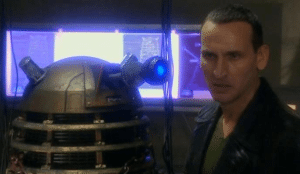

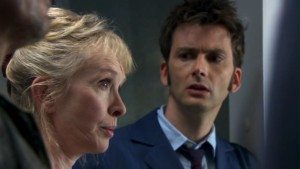
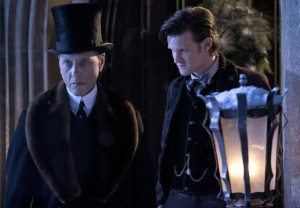

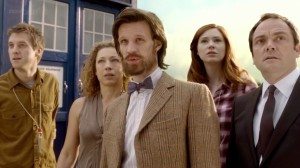
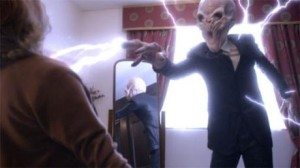
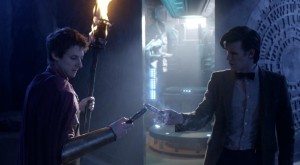
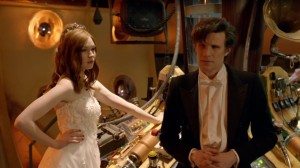
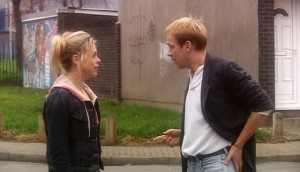
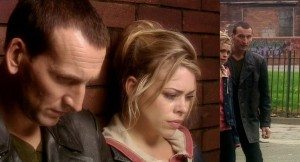
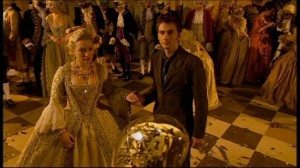
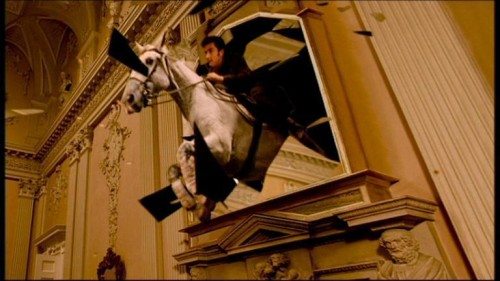
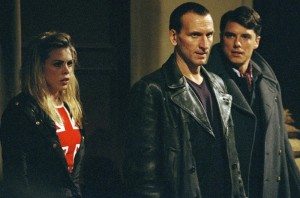
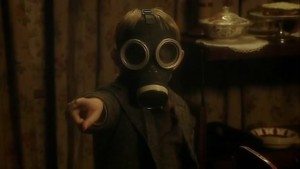
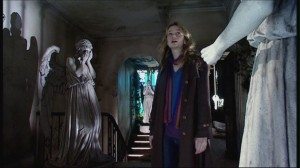
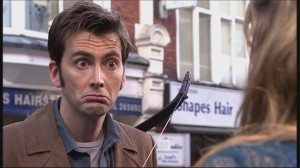
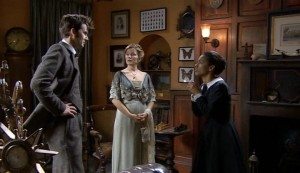
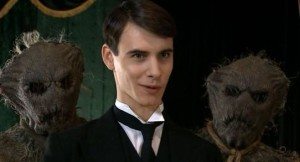
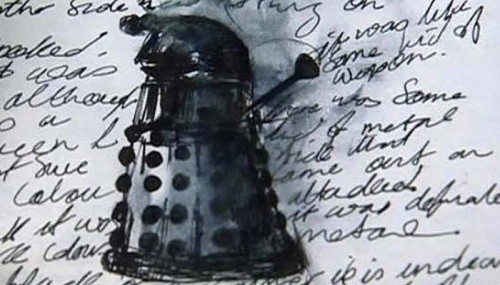
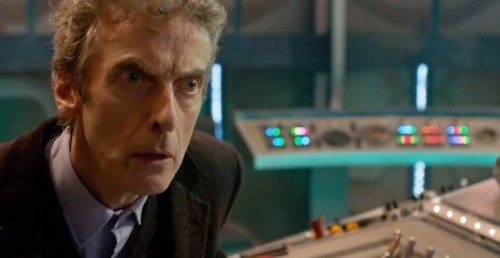
If Ben Wheatley is contributing the first two instalments of the new season, then I truly have high hopes for it. And honestly I do believe Dr. Who needs it after that Matt Smith Season which almost cured me from all those years of Dr Who fandom. Whilst Ecclestone and Tenant were great impersonators of the Doctor, each with a completely different personality and yet both perfectly and plausibly working as such, Smith completely ruined it for me.
I know that Dr. Who can’t just reduced to the Doctor and it would be simply not be just to judge the impact of the season by one guy’s performance, but trust me, if that guy is Matt Smith, then yeah, one can safely assume that great disservice can be done to the nimbus of Dr. Who by one guy alone!
I have tried to like Dr. Who and only half succeeded. Made it through the first couple of seasons and then just failed to really care.
Much like the Sopranos.
Let the scorn and ridicule commence.
You, sir, are a known heathen.
Never talk to me like that again! No one created me! I am Evil. Evil existed long before good. I made myself. I cannot be unmade. I am all powerful!
Oh yes, Human Nature/Family of Blood and Blink were outstanding episodes! Thanks for reminding me!
My God, David Tennant was great.
Sigh.